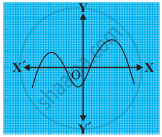Advertisements
Advertisements
Question
Find the value of k such that the polynomial x2 − (k + 6)x + 2(2k −1) has sum of its zeros equal to half of their product.
Solution
Given polynomial is x2 - (k + 6) x + 2 (2k – 1)
Here
a = 1, b = - (k + 6), c = 2 (2k – 1)
Given that,
Sum of zeroes = `(1)/(2)` product of zeroes
⇒ `[-[-("k"+6)]]/(1) = (1)/(2) xx (2(2"k" - 1))/(1)`
⇒ `"k" + 6 = 2"k" - 1`
⇒ `6 + 1 = 2"k" - "k"`
⇒ `"k" = 7`
APPEARS IN
RELATED QUESTIONS
The graphs of y = p(x) are given in following figure, for some polynomials p(x). Find the number of zeroes of p(x).

If f(x) =`x^3-3x+5x-3` is divided by g(x)=`x^2-2`
Find all the zeroes of `(2x^4 – 3x^3 – 5x2 + 9x – 3)`, it is being given that two of its zeroes are `sqrt3 and –sqrt3`.
If one zero of the quadratic polynomial `kx^2 + 3x + k is 2`, then find the value of k.
If the sum of the zeros of the quadratic polynomial `kx^2-3x + 5` is 1 write the value of k..
If the zeroes of the quadratic polynomial x2 + (a + 1) x + b are 2 and –3, then ______.
Given that one of the zeroes of the cubic polynomial ax3 + bx2 + cx + d is zero, the product of the other two zeroes is ______.
If one of the zeroes of a quadratic polynomial of the form x² + ax + b is the negative of the other, then it ______.
If 4x² – 6x – m is divisible by x – 3, the value of m is exact divisor of ______.
The zeroes of the quadratic polynomial x2 + kx + k, k ≠ 0 ______.
